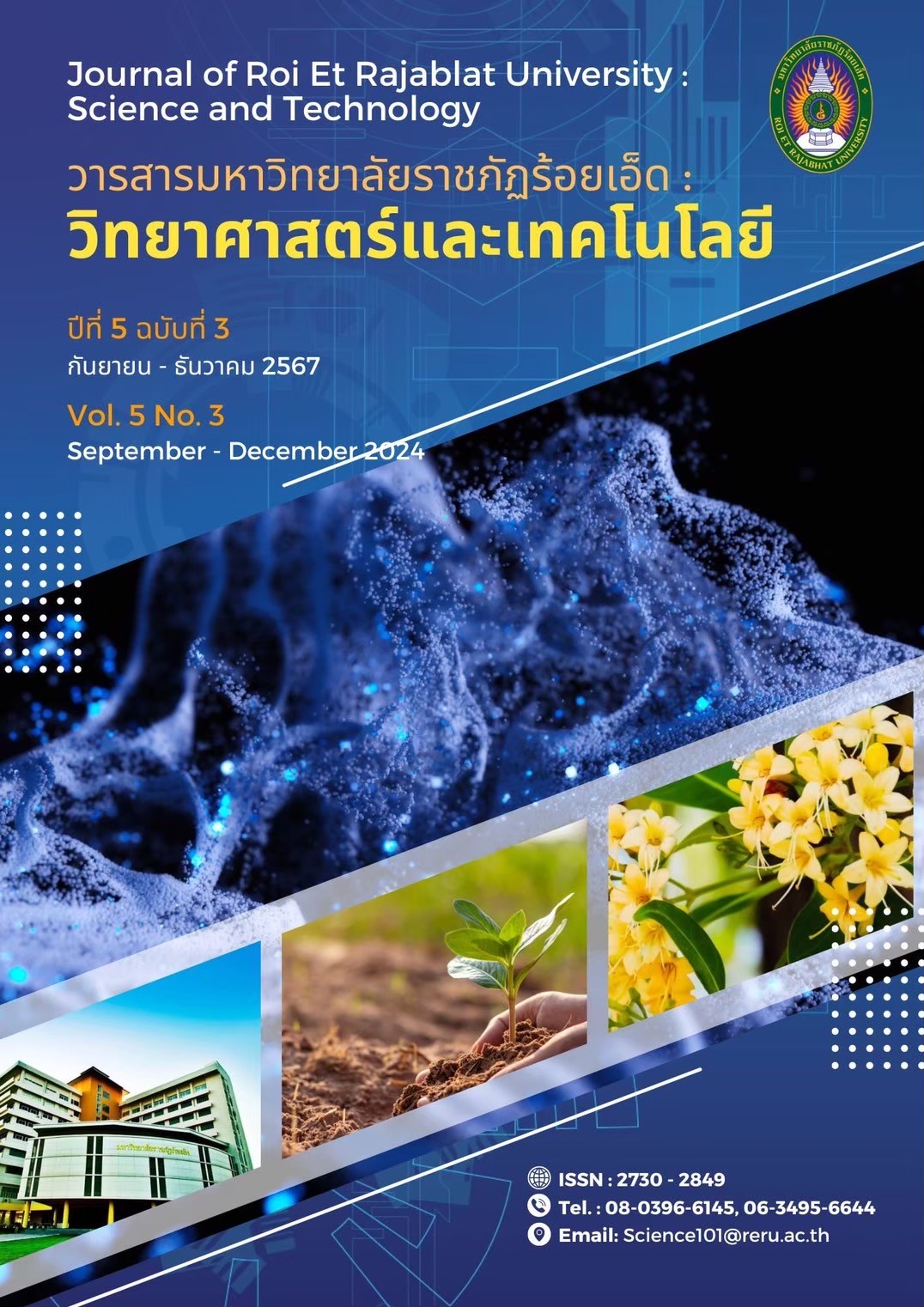The Impact of Digital Technology on Vocabulary Knowledge and English Listening Skills
คำสำคัญ:
English vocabulary knowledge, English sentence listening skills, simple regression analysis, technology, digital tools in learningบทคัดย่อ
This research aimed to investigate 1) English vocabulary knowledge, 2) English sentence listening skills, 3) the relationship between vocabulary knowledge and listening skills, 4) the influence of vocabulary knowledge on listening skills among English major students, and 5) the role of technology and digital tools in enhancing vocabulary knowledge and listening skills. 6) To investigate the correlation between technology usage behavior and English vocabulary knowledge among English major students. The sample consisted of 200 undergraduate students majoring in English from the Faculty of Education and Human Development at Roi Et Rajabhat University. The research instruments included English vocabulary tests including 15 items with item difficulty between 0.51 to 0.73, item discrimination between 0.22 to 0.45, and reliability at 0.67 using KR 20, and listening skills tests included 15 items difficulty between 0.37 to 0.70, item discrimination between 0.24 to 0.38, and reliability at 0.72 using KR 20 , and questionnaires regarding the use of technology in learning English containing 21 items with Cronbach’s Alpha at 0.76. The statistical methods used for data analysis were mean, standard deviation, percentage, Pearson correlation, and simple regression analysis.
เอกสารอ้างอิง
Allal-Sumoto, T. K., Miyoshi, K., & Mizuhara, H. (2023). The effect of productive vocabulary knowledge on second language comprehension. Frontiers in Psychology, 14, 1049885. https://doi.org/10.3389/fpsyg.2023.1049885
Ammade, S., Mahmud, M., Jabu, B., & Tahmir, S. (2018). Integrating technology in English language teaching: Global experiences and lessons for Indonesia. International Journal of English Linguistics, 8(6), 107–119. https://doi.org/10.5539/ijel.v8n6p107
Bonk, W. J. (2000). Second language lexical knowledge and listening comprehension. International Journal of Listening, 14(1), 14-31. https://doi.org/10.1080/10904018.2000.10499033
CIDDL. (2022). AI-powered learning language tools for English language learners. Center for Innovation, Design, and Digital Learning (CIDDL). Retrieved from https://ciddl.org/ai-powered-learning-languages-tools-for-english-language-learners
Field, J. (2008). Listening in the Language Classroom. Cambridge University Press.
http://dx.doi.org/10.1017/CBO9780511575945
Godwin-Jones, R. (2011). Emerging technologies: Language learning on the web and mobile devices. Language Learning & Technology, 15, 2-11. Retrieved from https://www.lltjournal.org/item/10125-44208/
Golonka, E. M., Bowles, A. R., Frank, V. M., Richardson, D. L., & Freynik, S. (2012). Technologies for foreign language learning: a review of technology types and their effectiveness. Computer Assisted Language Learning, 27(1), 70–105. https://doi.org/10.1080/09588221.2012.700315
Gonulal, T. (2020). Improving listening skills with extensive listening using podcasts and vodcasts. International Journal of Contemporary Educational Research, 7(1), 311-320. https://doi.org/10.33200/ijcer.685196
Kukulska-Hulme, A. (2012). Mobile-assisted language learning. In The Encyclopedia of Applied Linguistics. https://doi.org/10.1002/9781405198431.wbeal0768
Kukulska-Hulme, A., & Viberg, O. (2018). Mobile collaborative language learning: State of the art. British Journal of Educational Technology, 49(2), 207-218. https://doi.org/10.1111/bjet.12580
Li, Rui. (2023). Effects of Mobile-Assisted Language Learning on EFL Learners’ Listening Skill Development. Educational Technology & Society, 26(2). 36-49. https://doi.org/10.30191/ETS.202304_26(2).0003
Mallillin, L. D. (2021). ELT in Both Private and Public Higher Education Institutions (HEIs): An Approach to New Normal Pedagogy of Teaching. European Journal of English Language Studies, 1-14. https://doi.org/10.12973/ejels.1.1.1
Nakata, T. (2011). Computer-assisted second language vocabulary learning in a paired-associate paradigm: a critical investigation of flashcard software. Computer Assisted Language Learning, 24(1), 17–38. https://doi.org/10.1080/09588221.2010.520675
Nation, I. S. P. (2001). Learning Vocabulary in Another Language. Cambridge University Press. https://doi.org/10.1017/CBO9781139524759
Nguyen, V. T., & Thanh, H. (2022). The impacts of mobile-assisted language learning (MALL) on freshmen’s vocabulary acquisition and their perspectives. Advances in Social Science, Education and Humanities Research, 655, 134-142. https://doi.org/10.2991/assehr.k.211224.027
Renandya, W. A., & Farrell, T. S. C. (2011). “Teacher, the Tape Is Too Fast!” Extensive Listening in ELT. ELT Journal, 65, 52-59. https://doi.org/10.1093/elt/ccq015
Saputra, Yuyus & Fatimah, Asri. (2018). The use of TED and YOUTUBE in Extensive Listening Course: Exploring possibilities of autonomy learning. Indonesian Journal of English Language Teaching, 13(1). 73-84. https://doi.org/10.25170/ijelt.v13i1.1451
Shortt, M., Tilak, S., Kuznetcova, I., Martens, B., & Akinkuolie, B. (2021). Gamification in mobile-assisted language learning: a systematic review of Duolingo literature from public release of 2012 to early 2020. Computer Assisted Language Learning, 36(3), 517–554. https://doi.org/10.1080/09588221.2021.1933540
Schmitt, N. (2010). Researching Vocabulary: A Vocabulary Research Manual. Palgrave Macmillan. http://dx.doi.org/10.1057/9780230293977
Son, J., Ružić, N., & Philpott, A. (2023). Artificial intelligence technologies and applications for language learning and teaching. Journal of China Computer-Assisted Language Learning. https://doi.org/10.1515/jccall-2023-0015
Stahl, S. A., & Nagy, W. E. (2006). Teaching word meanings. Lawrence Erlbaum Associates.
https://doi.org/10.4324/9781410615381
The Jamovi Project (2022). Jamovi (Version 2.3) [Computer Software]. Retrieved from https://www.jamovi.org.
Vandergrift, L. (2007). Recent developments in second and foreign language listening comprehension research. Language Teaching, 40(3), 191-210. https://doi.org/10.1017/S0261444807004338
Vandergrift, L., & Goh, C. C. M. (2018). Teaching and Learning Second Language Listening: Metacognition in Action. Routledge.
Ward, J. (2018). Second language listening in an academic context: Lexical, perceptual, and contextual cues to word recognition. Doctoral dissertation, University of Reading, UK. https://centaur.reading.ac.uk/84919/
Webb, S., & Nation, P. (2017). How vocabulary is learned. Oxford University Press.
Yamane, T. (1967). Statistics: An Introductory Analysis (2nd Ed.). Harper and Row.
Zhang, S., & Zhang, X. (2022). The relationship between vocabulary knowledge and L2 reading/listening comprehension: A meta-analysis. Language Teaching Research, 26(4), 696-725. https://doi.org/10.1177/1362168820913998
Zhu, H., & Amponstira, F. (2023). Impact of artificial intelligence assisted approach on English teaching and learning. Nimitmai Review Journal, 6(1), 38–55. https://so04.tci-thaijo.org/index.php/nmrj/article/view/253705
ดาวน์โหลด
เผยแพร่แล้ว
เวอร์ชัน
- 25-02-2025 (2)
- 13-12-2024 (1)
รูปแบบการอ้างอิง
ฉบับ
ประเภทบทความ
สัญญาอนุญาต
ลิขสิทธิ์ (c) 2024 คณะศิลปศาสตร์และวิทยาศาสตร์ มหาวิทยาลัยราชภัฏร้อยเอ็ด

อนุญาตภายใต้เงื่อนไข Creative Commons Attribution-NonCommercial-NoDerivatives 4.0 International License.
บทความที่ได้รับการตีพิมพ์เป็นลิขสิทธิ์ของคณะศิลปศาสตร์และวิทยาศาสตร์ มหาวิทยาลัยราชภัฏร้อยเอ็ด
ข้อความที่ปรากฏในบทความแต่ละเรื่องในวารสารวิชาการเล่มนี้เป็นความคิดเห็นส่วนตัวของผู้เขียนแต่ละท่านไม่เกี่ยวข้องกับมหาวิทยาลัยราชภัฎร้อยเอ็ด และคณาจารย์ท่านอื่นๆในมหาวิทยาลัยฯ แต่อย่างใด ความรับผิดชอบองค์ประกอบทั้งหมดของบทความแต่ละเรื่องเป็นของผู้เขียนแต่ละท่าน หากมีความผิดพลาดใดๆ ผู้เขียนแต่ละท่านจะรับผิดชอบบทความของตนเองแต่ผู้เดียว






